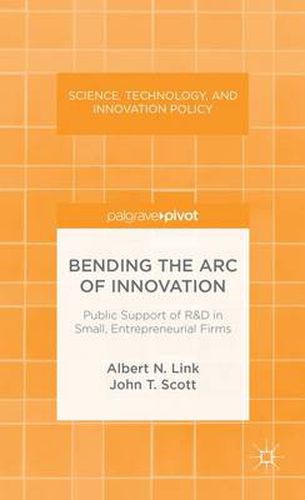Readings Newsletter
Become a Readings Member to make your shopping experience even easier.
Sign in or sign up for free!
You’re not far away from qualifying for FREE standard shipping within Australia
You’ve qualified for FREE standard shipping within Australia
The cart is loading…






This title is printed to order. This book may have been self-published. If so, we cannot guarantee the quality of the content. In the main most books will have gone through the editing process however some may not. We therefore suggest that you be aware of this before ordering this book. If in doubt check either the author or publisher’s details as we are unable to accept any returns unless they are faulty. Please contact us if you have any questions.
In this exciting work, Link and Scott summarize more than a decade of their research on public support of R&D in small, entrepreneurial firms, concluding public R&D investments, primarily funded by the U.S. Small Business Innovation Research (SBIR) program, are indeed bending the arc of innovation. Firms that receive SBIR project funding would not undertake the projects in the absence of SBIR’s support. SBIR support has had a positive impact on the employment trajectory of firms and their ability to commercialize innovations.
Bending the Arc of Innovation offers a theoretical model of the effects of the SBIR program. Link and Scott demonstrate that with SBIR support of R&D often comes contractual commercial agreements with other firms to sell the rights to the technology generated by the public support. These agreements between another firm and a small firm with a SBIR-award enable an effective transfer of knowledge created with the small firm’s publicly-supported research. Both parties to the agreement have better access to the knowledge resources of the other. Link and Scott show how these agreements allow the dedication of resources and organizational efforts necessary for the commercially successful access to and use of external knowledge.
$9.00 standard shipping within Australia
FREE standard shipping within Australia for orders over $100.00
Express & International shipping calculated at checkout
This title is printed to order. This book may have been self-published. If so, we cannot guarantee the quality of the content. In the main most books will have gone through the editing process however some may not. We therefore suggest that you be aware of this before ordering this book. If in doubt check either the author or publisher’s details as we are unable to accept any returns unless they are faulty. Please contact us if you have any questions.
In this exciting work, Link and Scott summarize more than a decade of their research on public support of R&D in small, entrepreneurial firms, concluding public R&D investments, primarily funded by the U.S. Small Business Innovation Research (SBIR) program, are indeed bending the arc of innovation. Firms that receive SBIR project funding would not undertake the projects in the absence of SBIR’s support. SBIR support has had a positive impact on the employment trajectory of firms and their ability to commercialize innovations.
Bending the Arc of Innovation offers a theoretical model of the effects of the SBIR program. Link and Scott demonstrate that with SBIR support of R&D often comes contractual commercial agreements with other firms to sell the rights to the technology generated by the public support. These agreements between another firm and a small firm with a SBIR-award enable an effective transfer of knowledge created with the small firm’s publicly-supported research. Both parties to the agreement have better access to the knowledge resources of the other. Link and Scott show how these agreements allow the dedication of resources and organizational efforts necessary for the commercially successful access to and use of external knowledge.